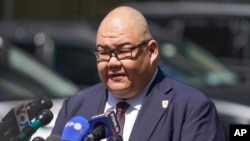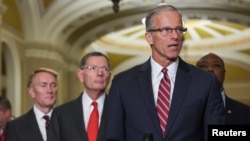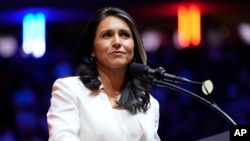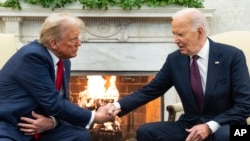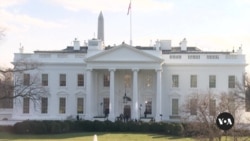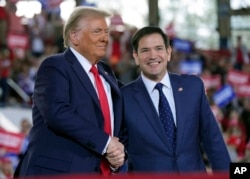
U.S. President-elect Donald Trump has selected North Dakota Governor Doug Burgum to run the Interior Department, as his new Cabinet continues to take shape. He also named two people to positions in the White House.
The transition team officially announced the choice of Burgum on Friday, though Trump first announced the selection late Thursday during a dinner at his Florida estate, Mar-a-Lago.
Additionally, Trump announced Friday that Burgum also will lead a newly created National Energy Council that will be established to help the U.S. achieve "energy dominance" around the globe.
In this role, Burgum will direct a panel that crosses all executive branch agencies involved in energy permitting, production, generation, distribution, regulation and transportation, Trump said in a statement. As chairman of the National Energy Council, Burgum will have a seat on the National Security Council, the president-elect said.
Burgum briefly ran against Trump as a candidate for the Republican presidential nomination in 2023 before dropping out and throwing his support behind the eventual president-elect.
The Trump-Vance transition team announced Steven Cheung will return to the Trump White House as communications director. He held the same position for the Trump-Vance 2024 presidential campaign and served in the White House during Trump’s first term as director of strategic response.
Friday evening, Trump announced that his campaign press secretary, Karoline Leavitt, would be his White House press secretary. She had served as assistant press secretary in his previous term in office.
Trump has swiftly named an array of political loyalists to key Cabinet positions. They remained vocal supporters during his four years out of office, and most of them are likely to win quick Senate approval after confirmation hearings.
Having won majorities in both the U.S. House of Representatives and the U.S. Senate, Republicans are set to take full control of the U.S. government by the third week in January.
"Republicans in the House and Senate have a mandate," newly reelected House Speaker Mike Johnson said earlier this week. "The American people want us to implement and deliver that 'America First' agenda" espoused by Trump.
Trump will be sworn in as the country's 47th president on January 20, two weeks after the new Congress has been seated.
The 78-year-old Trump campaigned on a sweeping agenda that Democrats will be largely powerless to stop unless joined by a handful of Republican defectors in Congress on any specific issue that would undercut the party's slim majorities in both chambers.
Republicans will have a 53-47 edge in the Senate, and the tie-breaking vote of Vice President-elect JD Vance in the event of a 50-50 stalemate on any legislative proposal. Republicans have secured at least 218 seats in the 435-member House, pending the outcome of seven undecided elections for two-year terms.
During his bid to win a second, nonconsecutive four-year term, Trump called for the massive deportation of millions of undocumented migrants living in the U.S. to their home countries, an extension and expansion of 2017 tax cuts that are set to expire at the end of 2025, further deregulation of businesses, a curb on climate controls, and prosecution of his political opponents, people he calls "the enemy within."
Senator John Thune of South Dakota, newly elected by his fellow Republicans as the Senate majority leader, said, "This Republican team is united. We are on one team. We are excited to reclaim the majority and to get to work with our colleagues in the House to enact President Trump's agenda."
Trump also has called on Senate Republican leaders to allow him to make "recess appointments," which could occur when the chamber is not in session and would erase the need for time-consuming and often contentious confirmation hearings.
Despite the likelihood that most of his nominees will be approved, Trump this week named four who immediately drew disparaging assessments from several Democrats and some Republicans for their perceived lack of credentials.
They are former Representative Matt Gaetz as attorney general; former Democratic congresswoman turned Republican Tulsi Gabbard as director of national intelligence; former junior military officer and Fox News host Pete Hegseth as defense secretary; and former presidential candidate and anti-vaccine activist Robert F. Kennedy Jr. to lead the Department of Health and Human Services.
The blowback presages tough confirmation fights for the four in the Senate, which reviews the appointments of top-level officials and then votes to confirm them or, on occasion, reject them, forcing the White House to make another choice.
The appointment of Gaetz, 42, could prove particularly problematic, with some senators openly questioning whether he can win a 51-vote majority to assume the government's top law enforcement position.
A House ethics committee probe was in the final stages of investigating whether he engaged in sexual misconduct and illicit drug use when he announced his resignation from the chamber late Wednesday, ending the probe.
The Justice Department that Gaetz hopes to lead had decided not to pursue criminal charges. Gaetz has denied all wrongdoing.
Gabbard, 43, has been attacked for her lack of direct experience in intelligence and accused of disseminating pro-Russian disinformation. If confirmed, she would be tasked with overseeing 18 U.S. intelligence agencies. She won over Trump with her switch from being a one-time Democratic House member from Hawaii to changing parties and staunchly advocating for his election.
Critics have assailed Hegseth, a 44-year-old decorated former military officer, as someone who lacks managerial experience in the military or business world. A weekend anchor on Fox News, he has voiced his opinions on military operations, including his opposition to women serving in combat roles. He has lobbied Trump to pardon military service members accused of war crimes.
A descendant of the Kennedy family political dynasty, Kennedy, 70, for years has been one of the country's most prominent proponents of anti-vaccine views. He has also opposed water fluoridation and suggested the coronavirus could have been deliberately designed to affect some ethnic groups more than others.
On Thursday, Trump also selected former Securities and Exchange Commission Chairman Jay Clayton to be Manhattan's top federal prosecutor; and former Representative Doug Collins to be secretary of the Department of Veterans Affairs.
He named one of his personal criminal defense attorneys, Todd Blanche, to be deputy attorney general, and another of his attorneys, D. John Sauer, to be solicitor general.
The Associated Press provided some information for this report.




